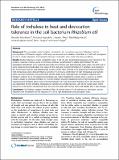Please use this identifier to cite or link to this item:
http://hdl.handle.net/10261/62308Share/Export:
 SHARE
BASE SHARE
BASE
|
|
| Visualizar otros formatos: MARC | Dublin Core | RDF | ORE | MODS | METS | DIDL | DATACITE | |

| Title: | Role of trehalose in heat and desiccation tolerance in the soil bacterium Rhizobium etli |
Authors: | Reina-Bueno, Mercedes; Argandoña, Montserrat; Nieto, Joaquín J.; Hidalgo-García, Alba CSIC ORCID; Iglesias-Guerra, Fernando; Delgado Igeño, María Jesús CSIC ORCID; Vargas, Carmen | Issue Date: | 17-Sep-2012 | Publisher: | BioMed Central | Citation: | BMC Microbiology. 2012 Sep 17;12(1):207 | Abstract: | Abstract Background The compatible solute trehalose is involved in the osmostress response of Rhizobium etli, the microsymbiont of Phaseolus vulgaris. In this work, we reconstructed trehalose metabolism in R. etli, and investigated its role in cellular adaptation and survival to heat and desiccation stress under free living conditions. Results Besides trehalose as major compatible solute, R. etli CE3 also accumulated glutamate and, if present in the medium, mannitol. Putative genes for trehalose synthesis (otsAB/treS/treZY), uptake (aglEFGK/thuEFGK) and degradation (thuAB/treC) were scattered among the chromosome and plasmids p42a, p42c, p42e, and p42f, and in some instances found redundant. Two copies of the otsA gene, encoding trehalose-6-P-synthase, were located in the chromosome (otsAch) and plasmid p42a (otsAa), and the latter seemed to be acquired by horizontal transfer. High temperature alone did not influence growth of R. etli, but a combination of high temperature and osmotic stress was more deleterious for growth than osmotic stress alone. Although high temperature induced some trehalose synthesis by R. etli, trehalose biosynthesis was mainly triggered by osmotic stress. However, an otsAch mutant, unable to synthesize trehalose in minimal medium, showed impaired growth at high temperature, suggesting that trehalose plays a role in thermoprotection of R. etli. Desiccation tolerance by R. etli wild type cells was dependent of high trehalose production by osmotic pre-conditioned cells. Cells of the mutant strain otsAch showed ca. 3-fold lower survival levels than the wild type strain after drying, and a null viability after 4 days storage. Conclusions Our findings suggest a beneficial effect of osmotic stress in R. etli tolerance to desiccation, and an important role of trehalose on the response of R. etli to high temperature and desiccation stress. | URI: | http://hdl.handle.net/10261/62308 | Identifiers: | http://dx.doi.org/10.1186/1471-2180-12-207 |
| Appears in Collections: | (EEZ) Artículos |
Files in This Item:
| File | Description | Size | Format | |
|---|---|---|---|---|
| 1471-2180-12-207.xml | 133,38 kB | XML | View/Open | |
| 1471-2180-12-207-S1.PDF | 68,44 kB | Adobe PDF |  View/Open | |
| 1471-2180-12-207.pdf | 897,89 kB | Adobe PDF |  View/Open | |
| 1471-2180-12-207-S3.PDF | 80,19 kB | Adobe PDF |  View/Open | |
| 1471-2180-12-207-S2.PDF | 33,79 kB | Adobe PDF |  View/Open |
CORE Recommender
Page view(s)
342
checked on Apr 24, 2024
Download(s)
709
checked on Apr 24, 2024
Google ScholarTM
Check
WARNING: Items in Digital.CSIC are protected by copyright, with all rights reserved, unless otherwise indicated.
